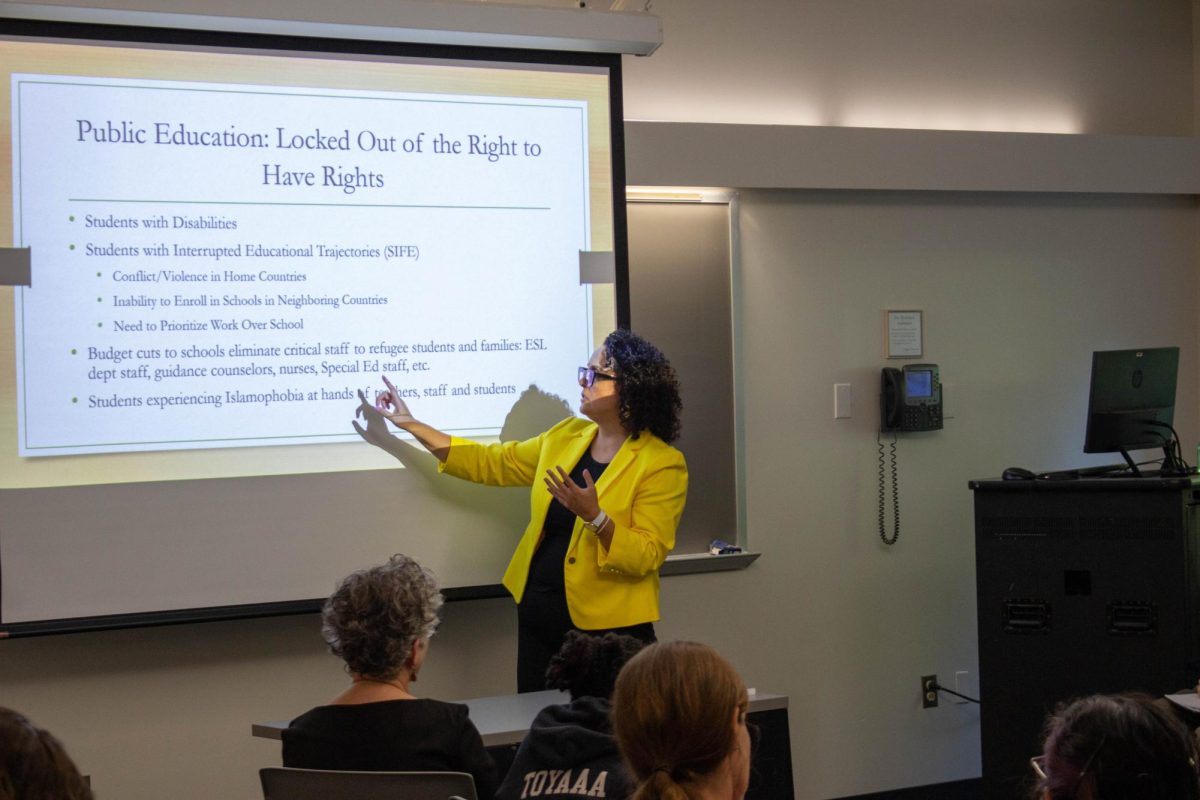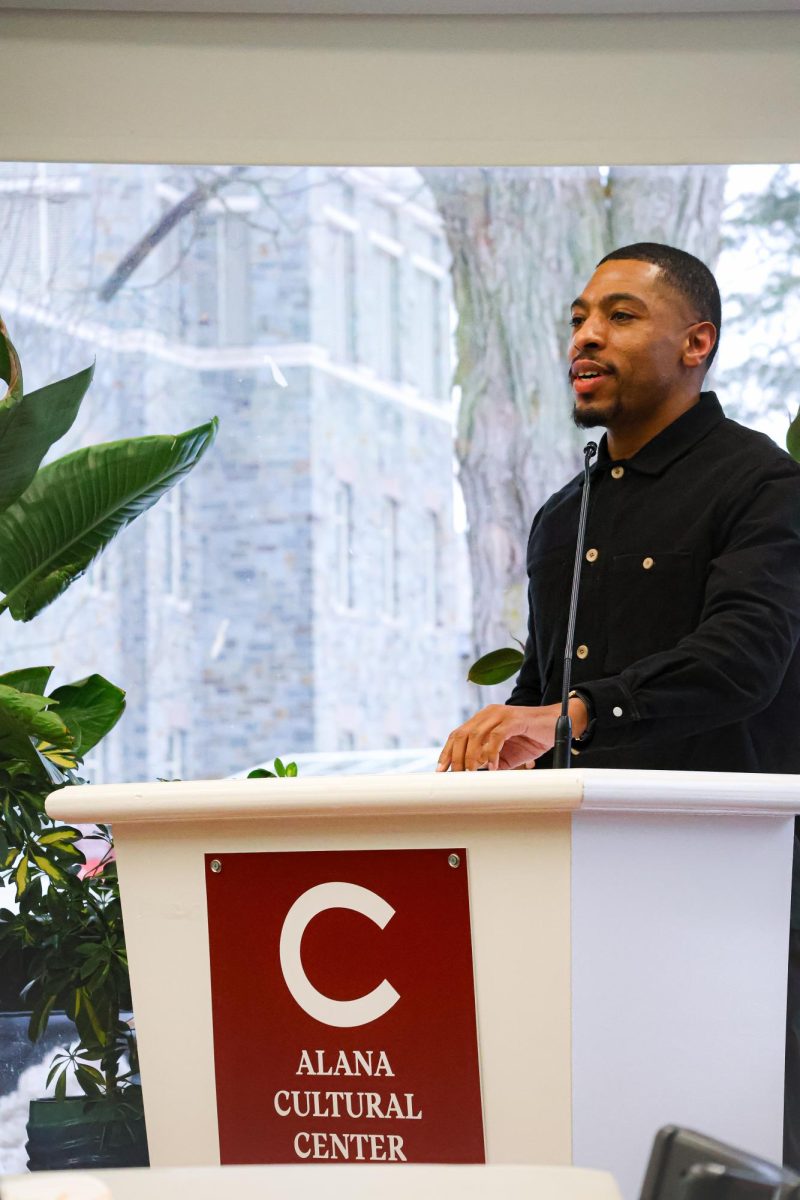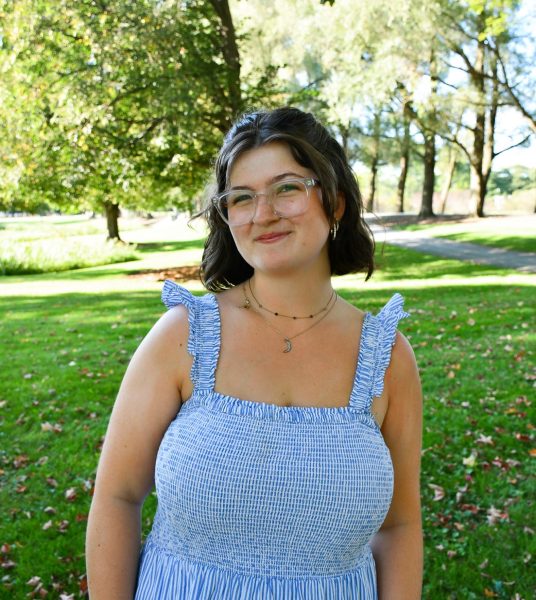Associate Professor of Educational Studies Sally Bonet presented research from her new book, “Meaningless Citizenship: Iraqi Refugees and the Welfare State” on Thursday, Sept. 21. The lecture was co-sponsored by the Education and Middle Eastern & Islamic Studies departments.
Associate Professor of Political Science Bruce Rutherford introduced Bonet’s lecture and spoke about the cross-disciplinary nature of her work.
“Sociologists can find things of interest in her work; anthropologists can, obviously; political scientists and legal scholars all can benefit from reading her very insightful research,” Rutherford said. “So her work is really the embodiment of what our Middle Eastern and Islamic Studies program tries to accomplish, this cross-disciplinary work on very important questions.”
Bonet, who is also teaching a research methods course this semester, began her lecture by discussing the background of Iraqi immigration to the U.S. and then delved into her research approach and questions. While Bonet intended to study refugee schoolchildren, she changed her approach after meeting with the students’ families.
“It dawned on me how arrogant I had been to think that a refugee child, who had been through hell, […] would want to meet this random Arab-American stranger and tell them their stories or let them follow around school or whatever it was,” Bonet said. “Parents and families wanted to meet me. And so the thing flipped, and I was being interviewed for weeks or months by families who needed to understand who I was.”
Though her original focus was on schools, Bonet got to know the different institutions that refugee families work with during her research. Each chapter of the book focuses on a different institution, including schools, resettlement centers, hospitals and more.
“Rather than it becoming a story about children in school, it became a story about families,” Bonet said. “And I learned from them that families matter, because over time, you lose almost everything. But the only thing, the only institution that’s left, is the family. And they wanted to tell their story, oftentimes collectively.”
Sophomore Grace Owusu-Amoah attended the lecture for a class but was interested in the topic from a human rights perspective, as well.
“Considering my future profession as a human rights lawyer and my interest in observing human issues and rights that are often denied to people, I was intrigued to see how this affects immigrants and their transitions to the United States,” Owusu-Amoah said.
Bonet worked with the families in her study for multiple years and was able to share some of their stories in her lecture, including one of the daughters she worked with who had to give up her dream upon arriving in the U.S.
“So this is Samaa, she was actually one of the ‘lucky’ students who was able to complete her education in Yemen,” Bonet said. “She moved from Iraq to Yemen. She worked full time in Yemen. She graduated with honors, and then she came to the U.S. and she had planned on becoming a doctor. But she got to the U.S. and was told, because she was a daughter of widowed parents, she had to support everybody. So she didn’t actually get to go to school,” Bonet said.
Owusu-Amoah connected with the personal stories that Bonet sprinkled throughout her lecture.
“The part of the lecture that resonated with me the most was the personal account from one of the refugees that she had included,” Owusu-Amoah said. “I don’t recall the exact words, but it was a girl expressing her disappointment with how things had turned out, especially after having high hopes for a better life. It left me with a lingering sense of sadness that stayed with me throughout the remainder of the lecture.”
Towards the end of her lecture, Bonet spoke about how the U.S. should do more than just let refugees into the country.
“But the point of putting this forward is to shine a light on the brokenness of a system that allows people in only to let them down,” Bonet said. “Some of us who have been advocating for refugees for years — people think the best America can do is just letting in people. But the question that [refugee work raises] is ‘And then what?’. If you let people in, only to have them become a member of the underclass […] if we’re letting people in, to join in those ranks, then is that enough? Is letting people in enough?”
Through the presentation of her work, Professor Bonet explored the many barriers that face Iraqi refugee families when they arrive in the U.S.
















